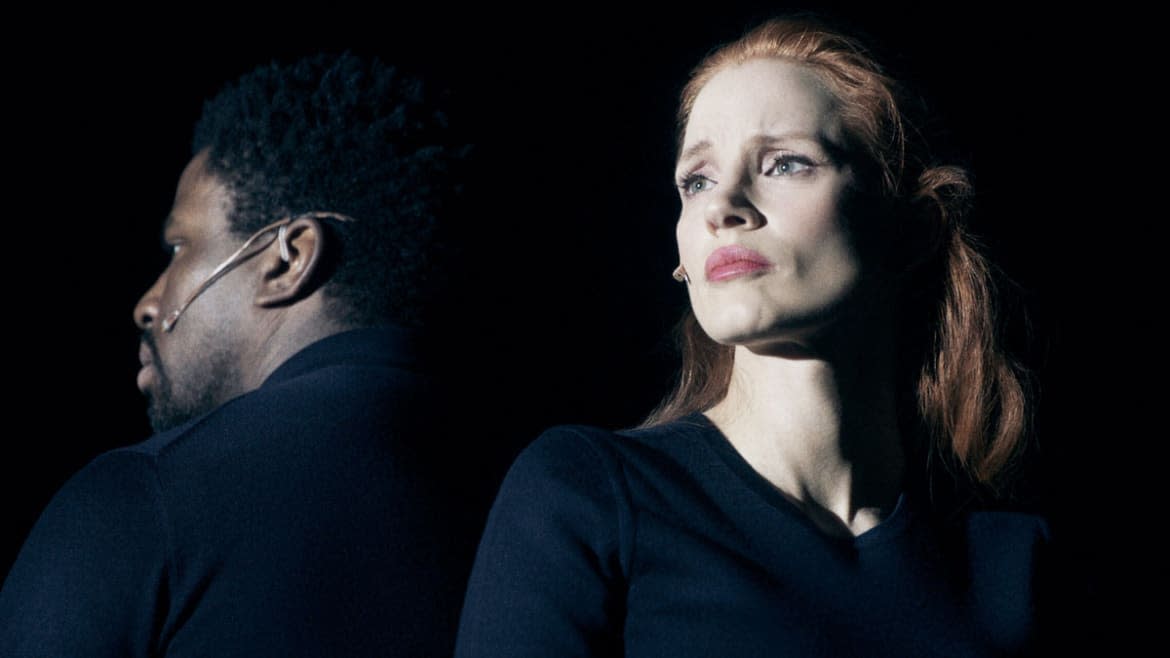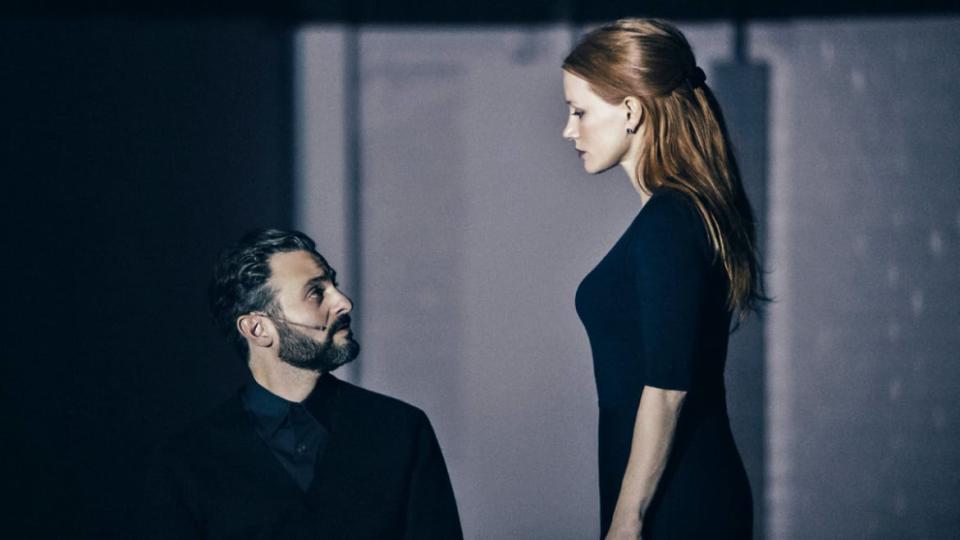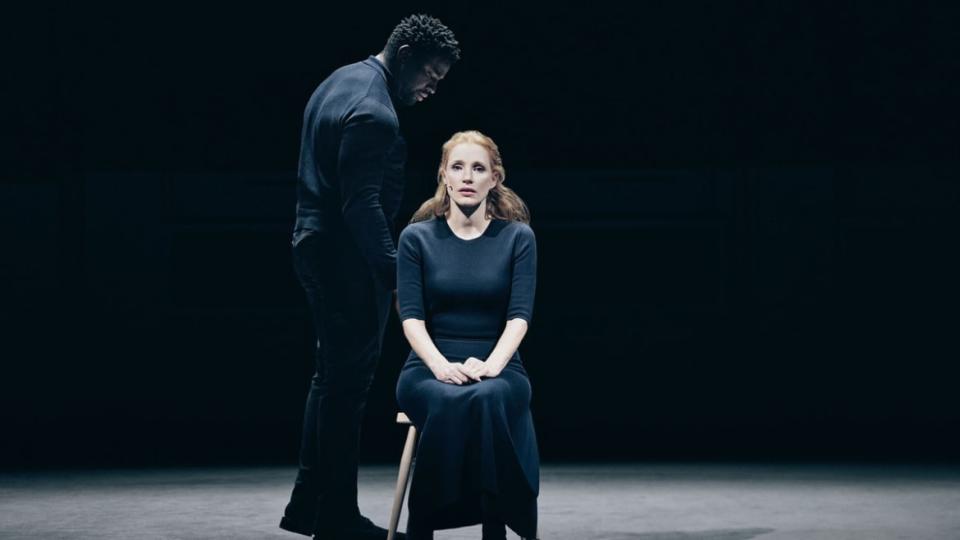Jessica Chastain Electrifies a No-Frills Broadway Revival of ‘A Doll's House’

- Oops!Something went wrong.Please try again later.
- Oops!Something went wrong.Please try again later.
On the Hudson Theatre’s bare stage, Jessica Chastain is sitting on a chair, revolving on a spinning section of it. Round and round the Oscar-winning actor goes. Audience members take their seats. She gazes out at the Broadway audience impassively, a ghost of a smile on her face, dressed in modern, modish black. Slowly, other characters in this modern adaptation of Ibsen’s 1879 play A Doll’s House (booking through June 10)—adapted by Amy Herzog, and directed by Jamie Lloyd—sit on seats on the stage, like satellites of Chastain, as she continues to spin.
The play begins sharply, with the spinning at an end, and Chastain as Nora Helmer taking on husband Torvald (Arian Moayed) on the subject of money, the all-consuming catalyst for what leads to Nora’s infamous break for freedom at the play’s climax, finally fed up of being coddled, patronized, and confined as a wife and mother. And wow, the final seconds of A Doll’s House conveying Nora’s liberation are stunningly realized—in theatrical terms epic, while also silently, fabulously melodramatic. Hold out for the visual OMG of the dénouement. It is, right now anyway, the best ending of any show on Broadway.
Jessica Chastain Proves Why She Earned That Oscar With ‘George & Tammy’
Those final moments are in stark contrast to the main body of the play. There is no set decoration, no props. When characters put on dresses, have parties, freak out over letters, and—most infamously in Nora’s case—slam the door on the family home, there are none of those things. The characters say they are doing things, but they are just speaking to each other. The Helmer children, Ivar, Bob, and Emmy are mentioned, they are played with and chided—but they are not seen. This stylistic trickiness is seductive at the start, but its obsessive negation of any conventions begins to annoy; thankfully the excellent actors do not.
Chastain told the New York Times that she didn’t want to feel “like a TED talk,” and it doesn’t. But it does feel very Inside the Actor’s Studio. If characters are not involved in the scenes, they sit at the edges of the blank stage on chairs. Stripped so utterly of conventional theatrical adornment, it focuses all attention on the words. The ways the characters are miked make their performances even more intimate; we hear their breaths as well as their words. Chastain spends much of the time seated, again focusing attention not just on Nora, but also how trapped she feels.
Her central problem remains that she has borrowed money from bank worker Krogstad (Okieriete Onaodowan), gained without Torvald’s knowledge and by forging her own dead father’s signature. Nora illegally borrowed the money for a trip that she and Torvald took to Italy when the latter was recovering from sickness (in those days women could not borrow money without a father or husband’s say-so). Now, Krogstad wants her to pay up, and—to stop Torvald from finding out—wants her to also ensure he doesn’t lose his job under Torvald.
Nora frets over the tightening of these screws, with only the help of an old friend Kristine (Jesmille Darbouze), who handily, or not, was once romantically involved with Krogstad. Doctor Rank (Michael Patrick Thornton), a friend who never seems to be away from the house, is hopelessly in love with Nora, and also facing his own mortality. Anne-Marie (Tasha Lawrence) the nanny watches on as this house of so many cards comes close to toppling.

Arian Moayed and Jessica Chastain in 'A Doll’s House.'
Chastain’s first brave decision is to not make Nora a victim, even for a moment. If she is trapped in this doll’s house, she has also marshaled a considerable amount of power within it. “Oh Torvald, we can be a tiny bit extravagant. Can’t we? Now that you’ll be making tons of money,” she tells her husband. Money, money, money is on Nora’s mind, from listing all her purchases to—when anticipating the material benefits of Torvald’s new job—excitedly telling Kristine, “Doesn’t that sound dreamy, to have lots of money and never have to worry again?”
“You haven’t changed at all! In school you were already famous for spending money,” Kristine replies.
For much time, Chastain sits center stage. Her face is its own fascinating, spinning stage of emotions—upset, mischief, goading, vanity, boastfulness, pride—and for most of the play you do you doubt that she is across everything. She is commanding, diva-ish, bossy, sharp. She feels she knows how to play Torvald. When Krogstad threatens her (Onaodowan cleverly balances a terse malevolence with an understandable desperation of his own), she says to him, “That you would take my secret, which I’m so proud of, and tell him in such an ugly, nasty way—that he would hear it from you. That would be...just incredibly...unpleasant.” That last word is said not with fear, but clipped condescension.
Darbouze as Kristine levelly holds her own as Nora seeks her help to neutralize Krogstad—willing to help, but as an equal with her own skin in the game, rather than patsy or adjunct.
And then there is Torvald; Moayed swipes whole scenes with a performance that is equal parts camp and terrifying. His Torvald’s puffed-up vanity is more sabotaging than his wife’s because he has so much less self-awareness than she possesses. He also emerges as a menacing gaslighter-in-chief, creepily repeating that his wife is his “little bird”—and guess who thinks he has keys to her cage. Of Krogstad (without knowing his wife’s deception), he notes, how Krogstad’s behavior fosters “a sick atmosphere, the lies contaminate the entire home. Every breath those children take in that house is filled with...evil...spores.”
The excellent Thornton brings a wonderful, nuanced life to Dr. Rank—rogue-ish, cove-ish, mordantly witty, deeply caring—whose declaration of love to Nora is met with disgusted condemnation—that, she says, it was “unnecessary” to say. “Why did you have to pick this moment to ruin everything?” His departure from the stage, and the world, saying to Nora the double-meaning, “Thank you for the light,” is spine-tingling and heart-thudding, all at once.

Okieriete Onaodowan, left, and Jessica Chastain in 'A Doll’s House.'
Krogstad notes, correctly, that Nora has been spoiled her whole life, but her own Faustian bargain to manage the torpor of living with Torvald crashes into a reality that is fast becoming impossible to manage and even more difficult to bear. Torvald’s objectification and deification of her as she dances—“a little looser and wilder than that dance is technically supposed to, but it doesn’t matter, everybody loved it, huge response”—is delivered with a dementedly prissy brio by Moayed.
He airily dismisses the news of Rank’s impending death: “Well, he’s been suffering for a long time, maybe it’s for the best. For us, too. It’s just you and me now.” And then he follows that up with a cloying embrace and: “Oh baby. I can’t hold you tight enough. Did you know that sometimes I fantasize that you’re in danger, real danger, so that I get to risk my life to save you?”
At this point, someone shouted out—on behalf of all of us—a thoroughly grossed-out “Oh my gaaadd!” When the truth about Nora and the loan is revealed, Moayed makes Torvald’s viciousness glint frighteningly, and—just as frighteningly, when the disaster of public humiliation is averted, he pathetically apologizes. “It’s true what they say, forgiveness feels good. I think I even love you a little more than I did half an hour ago.”
Cheez Nora, you think, knee him in the groin and get the hell out of there.
Well, Chastain does deliver a few audience-cheering home truths Torvald’s way. But it’s an odd change in register, given Nora’s quicksilver and intriguing mood changes that precede it. Here, her Nora suddenly becomes a very traditional Nora—solid, determined, resolute. It’s retribution and assertion delivered ever so politely.
Even though the dress is still modern, it’s the only part of the play where you can feel Nora in a bustle dress in the late 19th century, saying her piece, with all the forces of moral and philosophical certitude behind her. She links her father and her husband’s infantilization of her on a continuum. “I was just your doll wife, like I was Papa’s doll child. Our children became my dolls. I thought it was fun when you played with me just like they thought it was fun when I played with them. That was our marriage, Torvald.”
This Nora is more traditionally restrained in her actions than Chastain’s Nora of moments before. But perhaps this is the crunch moment, all games abated. And then… well, other reviews may reveal what happens at the end of this production of A Doll’s House. But there is no slammed door; in fact we see the absolute opposite.
This critic will only say Lloyd’s clever inversion of this legendary stage moment is not only perfect for this A Doll’s House, but a visually stunning, surprising way to end any Broadway show. It may even become a New York tableau to behold night in, night out. How appropriate it’s Chastain piloting it—a quintessentially Hollywood ending to a stellar performance.
Dark Disabled Stories
This sharply realized, highly recommended show—performed by Ryan J. Haddad, Dickie Hearts, and Alejandra Ospina (Public Theater, to March 26)—is a witty, outrage-inducing, and illuminating survey of what it means to be disabled. Written by Haddad in his off-Broadway writing debut, we follow the trio’s experiences running up against an able-bodied dominated world of both ignorance, prejudice, and sheer, dumb thoughtlessness.
Haddad, who has cerebral palsy and uses a walking frame, makes it absolutely clear at the outset that he is nobody’s victim. The show is not a “poor-me” listicle, but Haddad, Hearts, who is Deaf, and Ospina, who has cerebral palsy and uses a motorized wheelchair, reveal to the audience a panoply of situations the trip have faced—from sex to daily life and public transport—that present challenges. Jordan Fein’s direction and dots’ design are both playful and simple; and the way the play is staged (with Artistic Sign Language, captioning, and audio description) underlines not just its own carefully crafted narratives and messages, but also its proudly energized spirit.

Dickie Hearts, left, and Ryan J. Haddad in 'Dark Disabled Stories.'
Dark Disabled Stories isn’t a great show because it makes you think; it’s a great show because it’s funny, moving, enraging, and intelligent—and it reminds you how to see, listen, understand, and empathize with others. Ospina relating to us the nightmare of being a wheelchair user trying to negotiate the New York subway system is an infuriating litany of stations and a system that not only need radical improvement, but also just the more basic, human, professional duty to ensure information is updated. Ospina tells us how many times she has missed personal and professional engagements because lifts listed as working are not, in fact, working—meaning Ospina is left literally underground not knowing how and when she will be able to get out.
Dark Disabled Stories is streaked with Haddad’s biting, charming wit; and he and Hearts make a fabulous double act, as both scene partners and performance echoes of the other. Haddad recently told Playbill that he hopes the show could be produced by “HBO or Hulu or Netflix or Amazon or Showtime, or whoever does live specials.” This critic heartily endorses that ambition.
Haddad also told the publication, “All three of us move through the world differently. I think what we're offering you is: It's not everybody's story, it's our three. And I think that for the disabled audience, it’s about recognition, it's about relating to us, but also thinking about how I'm not the same as the disabled people in the audience. Our experiences are different, and if I saw a play about their life, it would probably deeply resonate, and also not. It's not a monolith, disability is not all one umbrella.”
Get the Daily Beast's biggest scoops and scandals delivered right to your inbox. Sign up now.
Stay informed and gain unlimited access to the Daily Beast's unmatched reporting. Subscribe now.

